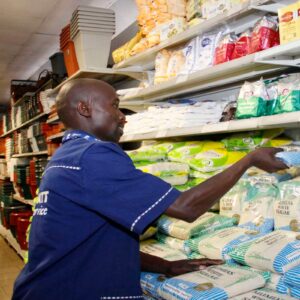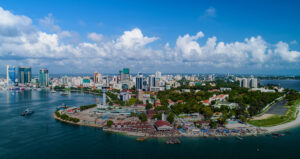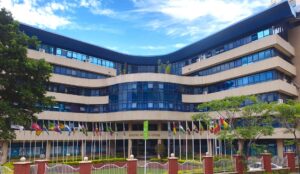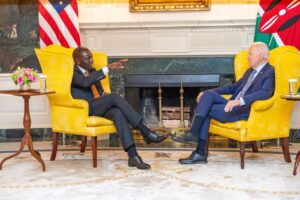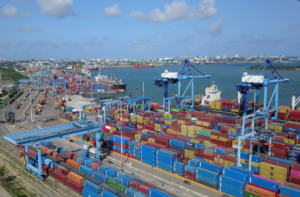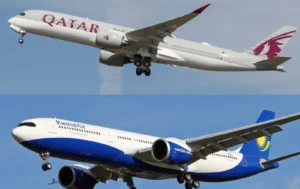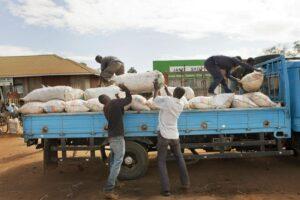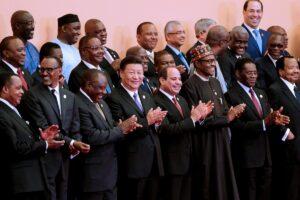- Africa’s new dawn: the rising role of digital and AI in agriculture
- Can Dangote Refinery Transform Africa Energy Ambition
- Gallup Survey: 80 per cent of Kenyan Workers Are Disengaged and Seek New Opportunities
- Madagascar Man Freed from 5KG Tumor After 15-Year Struggle
- How women in Africa are perceived and treated
- Sugar consumption in Kenya to Increase to 1.23 Million Tonnes
- Can Somalia and Turkey Oil deal Bring Change in Somaliland
- Remittances to Kenya dropped to $371.6 million in June, marking a six month low
Industry and Trade
- The construction took over 20 years and bears a processing capacity of 650,000 barrels per day 250,000 per day of gasoline and 100,000 of diesel.
- The Dangote oil refinery might halt the decades-long gasoline trade from Europe to Africa worth $17 billion each year.
Dangote Oil Refinery
Aliko Dangote, Nigeria’s and Africa’s wealthiest man ambition to foster energy reliance in his motherland and the region at large might be at risk. The giant oil refinery which is said to possess the potential to end decades-long gasoline trade from Europe to Africa worth $17 billion a year.
Concerns and tensions are high as a myriad of issues emerged before and since the $ 20 billion refinery came to life. According to various news reports, including the BBC and Reuters, the construction began in 2016 and started producing diesel and aviation fuel in January this year as petrol is expected to …
- Sugar consumption in Kenya is also expected to increase by 3.2 per cent this year driven by tourism and bakery
- Following the expiration of the ban in November 2023, production is expected to rebound significantly in 2024/25
- The survey also says that the growth in Kenya’s tourism sector will continue to create demand for sugar.
Kenya is expected to record a rise in sugar imports, as the effects of a ban on immature sugarcane processing kicks in, new findings have revealed. This is however expected to ease as millers ramp up their production
A report released by Fitch Solutions Company BMI and the United States Department of Agriculture shows that, the country should expect production to decrease by 32.9 per cent year on year in 2023/24 down to 530,000 tonnes from 790,000 tonnes in 2022/23.
This has majorly been attributed to the ban on sugarcane harvesting that was implemented in …
- According to the Turkish Energy Minister, Turkey will have exclusive rights for search and production when we find oil in these areas.
- Turkey and Somalia signed a defense and economic cooperation agreement during the Somali Defence minister’s visit to Ankara
- In March Somalia inked an oil and gas deal with Turkey which officials mentioned would foster cooperation in the exploration and exploitation of the deposits.
Somalia and Turkey Oil Deal
Despite being torn apart by civil war, Somalia’s geo-seismic studies have shown the war-torn country may have at least 30 billion barrels of oil and gas reserves.
Inching towards stability and fostering civil rest amid Islamic insurgents posing a threat to peace and harmony, Somalia’s newly discovered oil and gas deposits could be the nation’s breakthrough.
Although the resources take time to develop – exploration usually takes three to five years and production can only begin after the latter is …
- South African rating agency GCR has upgraded Shelter Afrique Development Bank’s global scale long issuer rating to B from B- and affirmed a stable outlook.
- Additionally, GCR has upgraded the national scale issuer ratings for Kenya, Nigeria, and Mauritius, all with stable outlooks, while recognizing Shelter Afrique’s transition to a treaty-based entity and strategic efforts to address capital arrears.
- This transformation has improved the bank’s operational and financial performance, enhanced governance, and solidified its legitimacy and confidence among members.
South African rating agency GCR, has upgraded Shelter Afrique Development Bank’s (ShafDB) international scale long issuer rating to B from B- and affirmed the short-term national scale issuer rating of B, with the outlook accorded as Stable.
At the same time, GCR has also upgraded the long and short-term national scale issuer ratings for Kenya to AA-(KE)/A1+(KE) from A+(KE)/ A1(KE); Nigerian to AA+(NG)/A1+(NG) from AA(NG) / A1+(NG); and Mauritian to BB+(MU)/B(MU) …
- The Japanese paint company will use Kenya as its gateway to the regional market
- NIPSEA Paint Kenya, the company will introduce products for automotive refinishing, car care, wood coating, and industrial coatings.
- The rise in infrastructure projects, including residential, commercial, and industrial developments, has fueled the demand for a wide range of paint products.
Japanese paint company Nippon, the world’s fourth-largest paint company coatings group in Asia Pacific, has expanded into Kenya as it targets to grow market share.
Through its Kenyan subsidiary, NIPSEA Paint Kenya, the company will introduce products for automotive refinishing, car care, wood coating, and industrial coatings.
Working through a distributorship model, Nippon Paint is setting Nairobi as its regional hub, before setting up in-country operations in the respective East African countries.
…“We are eager to establish our presence on the African continent through Nairobi and East Africa. Over the past two years, we have
- In the first three months of this year, Asia remained the leading source of Kenya’s imports accounting for goods worth $3.4 billion, as the country’s import bill closed the quarter at $5.4 billion.
- Kenyan traders and government imported goods worth $990.2 million from China, data by the Kenya National Bureau of Statistics (KNBS) shows, making it the biggest import source by country.
- Unlike his predecessors, President Ruto is seen to lean more towards the West as he seeks financing and trade cooperation.
Kenya’s imports from Asian countries including China
China and India remained the top exporters to Kenya in the first quarter of this year, leading other Far East nations in retaining a firm grip on the East African economic powerhouse’s trade and investment space, which they have dominated for over a decade.
This trend continues despite President William Ruto’s heightened charm offensive to economies from the West, which is …
- Business confidence slips to lowest since February
- Input prices rise mildly after back-to-back declines
- Steepest drops in activity and new work for seven months
Kenya’s business activity dips amid tax revolt
Kenya’s business activities fell sharply in June amid reports of widespread economic challenges and a negative impact on sales from protests and policy uncertainty, the Standard Bank’s Purchasing Managers’ Index (PMI) for June indicates. New business intakes dropped at the fastest rate since November last year, leading to a drop in business confidence and weaker job creation.
Although Kenyan firms also saw a renewed increase in their input costs in June, the rate of inflation was mild and had little impact on selling charges.
The survey by Stanbic Bank Kenya, compiled by S&P Global was conducted between June12 and June 26, with headline figure derived from the survey reading at 47.2 in June. Readings above 50.0 signal an improvement …
- Kenya’s tea exports increase on the reopening of the Tanzanian market
- Kenya had earlier in the month unveiled the China-Kenya Tea Trade Centre in Fujian province to distribute Kenyan tea in China.
- Kenya’s export value for the first time in history hit Sh1trillion in 2023, according to the 2024 economic survey by KNBS.
The volume of Kenya’s tea exports increased by 19 per cent in the first quarter of 2024, boosted by increased shipment to key markets, according to a communication from the Tea Board of Kenya (TBK).
The exports rose to 155.8 million kilograms, up from 131.1 million kgs posted in January-March 2023, the TBK said in a report released in Nairobi. The TBK attributed the surge to rising demand in traditional and emerging markets.
In the period under review Tanzania had reversed its decision to suspend imports of tea, that presented a window for Kenyan traders to …
- Kenya’s trade deficit rises amidst government push to grow exports
- The widening trade deficit indicates that the country’s capacity to create jobs locally and support its currency has dropped.
- Similarly, transportation and storage sectors slowed to 3.8 per cent in comparison to 6.6 per cent during the review period.
An increase in the value of imports into Kenya has widened the country’s trade deficit with its partners by Sh20 billion in the first quarter of 2024 compared to the same time last year, data by the Kenya National Bureau of Statistics (KNBS) shows
This saw the balance of payments widen from Sh110.5 billion in the first quarter of 2023 to Sh131.2 billion in the first quarter of 2024.
The statistics agency attributed this to increased expenditure on leading import commodities of petroleum and industrial machinery, particularly air transport equipment.
The favourable export earnings from tea and horticultural commodities that resulted …






